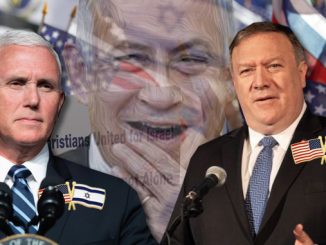
Provoking an “incident” or a false flag would be the best way to keep the U.S. in the Middle East forever, for Israel’s benefit. Philip Giraldi warns that “the current lineup of administration hotheads is so devoid of scruples that it might well be planning to either provoke or false-flag the United States into the longed-for war against Iran.”
By Phil Giraldi
The White House decision to withdraw American troops from Syria as soon as possible may or may not be on track depending on whom one believes. But one thing that is for sure is that the recent suicide bomber attack in Manbij, Syria, which killed four Americans and has been attributed to ISIS, has inspired the opponents of the drawdown to renew their claim that the terrorist group is still an active threat to the United States. President Donald Trump is now being subjected to heavy bipartisan and media pressure to reverse his decision.
It is perhaps a coincidence that the attack should take place not long after the White House announcement of the withdrawal, thereby giving ammunition to those who wish to stay in Syria, admittedly illegally, for the foreseeable future. Or is it perhaps something else? Why, one must ask, did ISIS do something against its own interests by attacking Americans and thereby increasing the odds that U.S. armed forces would remain in Syria? Wouldn’t it have been preferable to just let the American military leave, thereby eliminating one enemy from the playing field?
Former arms inspector Scott Ritter, in a detailed analysis of what is going on in Syria, has asked those questions and comes up with an explanation. Far from being an enemy of ISIS, the U.S. has actually served to protect the group. American presence in northeast Syria, where the ISIS remnants are still holding on, has actually prevented the final destruction of the terrorist group. Without the U.S. serving as an impediment, the armed forces of Syria aided by Russia and Iran would have already crushed ISIS in its remaining enclaves.
Thus it is, against all conventional wisdom, the United States that is serving as ISIS’s protector, and the group staged the bombing deliberately with that in mind because it is better from their viewpoint to have American forces remain. They also clearly understood enough about American politics and its media to realize that they would be giving fuel to those in Congress and among the mainstream punditry to put more pressure on Trump to have the troops remain in place.
That is how you start a war, or at least keep one going. It is called deception, or, when carried out by a state actor, a false flag in that the event is capable of being misinterpreted or mis-attributed to produce a desired result. There have been numerous deception operations throughout history used to start wars. The battleship Maine was not blown up by the Spaniards in Havana Harbor in 1898, but it served as a useful pretext to start a war that stripped Spain of its colonies. The Zimmerman telegram in World War I was a phony, but it helped bring the U.S. into the war against Germany. More recently there were the two Gulf of Tonkin incidents, both lies, which dramatically increased American involvement in Vietnam. And one should not forget the largely fabricated humanitarian and national security arguments made to attack Afghanistan, Iraq, and Libya.
If one goes by the message coming out of the White House and State Department, it would appear that the next country being targeted by the U.S. for regime change is Iran. And the best way to start the war would be to have the Iranians, or someone pretending to be the Iranians, attack a U.S. naval vessel in the Persian Gulf. If it were carried out by, let us suggest, the Israelis or Saudis, both of whom have motive to do so, it would be a false-flag operation leading to war. It would also be a false flag if the U.S. itself were to carry out the attack pretending to be Iranians. One recalls from the movie “Patton” the general’s hatred of the Russians and his rant at the end of the film, “In 10 days I’ll have us at war with those sons of b****** and I’ll make it look like their fault.” There are, unfortunately, many in D.C. who would support such an approach, including Secretary of State Mike Pompeo and National Security Adviser John Bolton.
Some observers are concerned that the current lineup of administration hotheads is so devoid of scruples that it might well be planning to either provoke or false-flag the United States into the longed-for war against Iran.
Unfortunately, to a certain extent, Iran is playing into the scheming by America’s hawks. Early in December, Iranian President Hassan Rouhani threatened to stop all shipping passing through the Strait of Hormuz if Washington moves to block Iranian oil exports when sanctions kick in early in May. He said, “If someday, the United States decides to block Iran’s oil, no oil will be exported from the Persian Gulf.”

Washington for its part is also upping the ante, having sent an aircraft carrier, the USS John C. Stennis, to the Persian Gulf recently as part of a “show of force.” Iran has also beefed up its forces by deploying a considerable naval force to the Indian Ocean near the Persian Gulf, ready to move into the strait and close it if ordered to do so. Iran claims that it “completely controls the strait.”
As nearly 30% of all seaborne oil passes through the Strait of Hormuz with the Stennis and Iranian forces on standby in the same area, the possibility of a fight starting either deliberately or by accident is growing. In early December, State Department Special Representative on Iran Brian Hook declared during a press conference that Washington would “not hesitate to use military force when our interests are threatened . . . the military option on the table.”
One does not have to suggest that either the United States or one of its alleged allies in the Middle East will inevitably take the low road and stage an incident, but the possibility remains it will occur to someone that this would be the easiest path to war. Others, who want war but are more cautious in terms of how they will initiate it, are probably waiting for the May 5 deadline when the U.S. embargo on Iranian oil sales kicks in. Iran will be forced to react, and the U.S. is no doubt preparing to strike back. We will thereby have a new war that serves no one’s interest apart from Israel and the Saudis and which will potentially devastate the region.
The American people will have to do the actual fighting and dying while also paying the bills afterwards and will emerge as the biggest losers.
Philip Giraldi is a former CIA counter-terrorism specialist and military intelligence officer and a columnist and television commentator. He is also the executive director of the Council for the National Interest. Other articles by Giraldi can be found on the website of the Unz Review.




